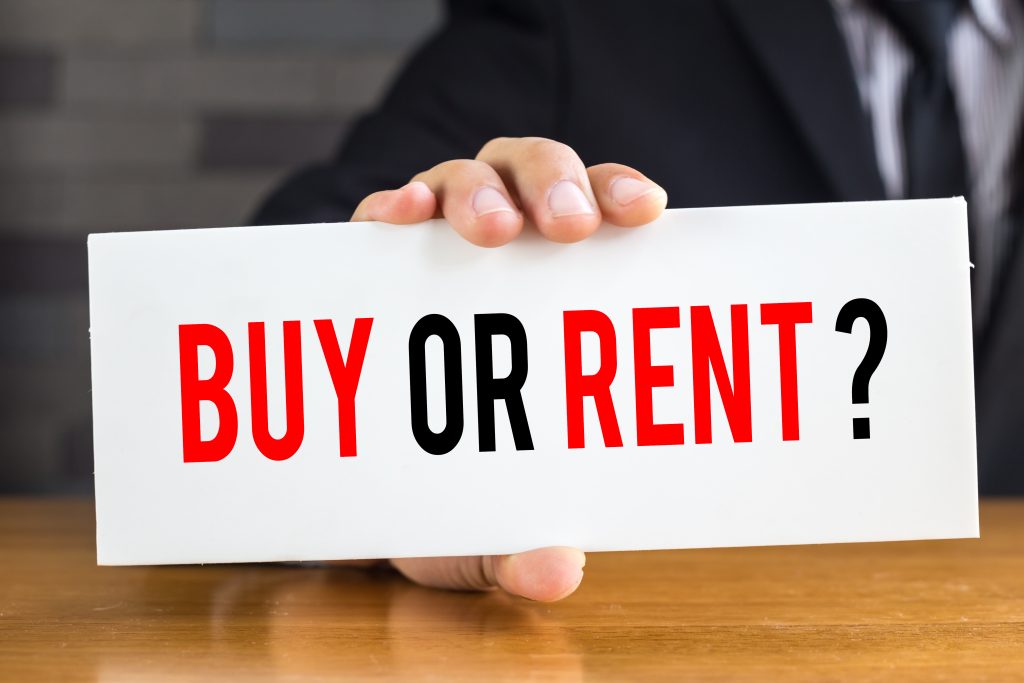It’s the question everyone asks themselves at one point in their lives: should I buy or rent? Answer: there’s no easy answer! A lot depends on your financial and personal situation, and where you wished to live and work. But that’s OK. This is always a good question to consider, especially when your circumstances changing.
Renting ups…
Renters aren’t always 20-something singles or couples with a small bank account. Plenty of families and older singles choose this road – regardless of their financial details – because of its simplicity. For a start, if the dishwasher breaks or your garage floods, tenants just need to pick up the phone and call their property manager. All the hard work in organising fix-ups, plus the money needed to pay for it, is a landlord’s issue, not yours. Phew! As well, you won’t have to splash your cash on council rates and insurance while in some areas, landlords may pay utility bills such as water. You don’t have to stay at this house forever either. Simply tell your property manager you’re not renewing your lease and move out. Bear in mind though that if you do want to move before your lease expires, problems can occur. On this point, there is a lot of talks out there about tenants not enjoying security as landlords can kick them out at a moment’s notice – or at least when the lease expires. That’s true, up to a point. But tenants who’ve rented for decades will also tell you they’ve never faced this issue and in fact, have seen the opposite occur in that landlords want them to stay at the home for as long as possible. Good tenants who care for the house and who always pay their rent on time usually fall into this category. Then too, renting instead of buying often gives you the opportunity to live in a house or suburb you couldn’t afford to purchase and this despite rent increases.
And renting downs…
Saying all this, renting a place that’s not your own home can be tough. You may have to check with the property manager as to whether it’s OK to hammer picture hooks in the walls or when your pet makes a mistake on the carpet. And as regards that same pet, landlords will want to know if you have one before you sign a lease and may not allow you to own certain animals. Probably the biggest downer about renting however is that it can prove costlier than buying in the long run. The initial outlay of a home loan deposit plus ongoing maintenance expenses, rates and more – to say nothing of the stress of finding and purchasing a house – can be overwhelming! But as a renter, you’ll always be helping to pay off your landlord’s mortgage. This is how that lovely phrase “dead money” can into being! And let’s face it, your rent may, and often does, increase over time or in different homes. Then again, renters can branch out in other smart financial ways, such as shares or other investments. Just think about whether the simplicity and flexibility of renting take priority over a potentially fat, long term bank account – even if this account initially goes into the red when you buy. There is no right or wrong answer per se but it’s definitely a point worth considering throughout your rental career. As well, try free online calculators comparing buying to renting. The results can be jaw-dropping!
Buying pros…
Hello freedom to renovate, landscape, hammer as many hooks into walls as you like and own plenty of pets! There are other reasons to celebrate when you buy a home too. Firstly, if you’ve chosen carefully and well, its value will steadily surge over time. Then there’s that lovely word (much more appealing than dead money!): equity. This is the difference between the property’s value and how much you still owe on your deposit. You can use, or borrow against, your equity and become a landlord yourself, go on a holiday or buy another car. Just be aware that doing this will see your home loan escalate so ensure your investment or similar is worth the years of savings you’ve put into your mortgage repayments. Talking repayments, you could be surprised at how much you now hesitate before buying an extra coffee or eating out. Could your money be better spent on shrinking your loan?
And buying cons…
While it’s highly exciting and appealing to own an asset that will rise in value over time, there are chances the opposite may happen. It all depends on the house and the strength of the property market. As we mentioned above, there’s the high upfront cost and ongoing expenses, plus interest rates and fees, to consider. You may not have much cash left over (beyond your mortgage repayments) to spend on investments or other opportunities. Also, another ugly word: repossession. If you fail to make regular mortgage repayments, the bank or lender will take back, or repossess, your house and on-sell it to help them recover your loan. Homeowners are often allowed a “second chance” or extra few weeks to bring themselves back up to scratch but otherwise, the lender can start legal action. Far scarier than having a landlord kick you out of a rental, no property owner ever wants to end up in Repossession Land.
Other options and ideas
If you’re undecided between renting or buying or simply want to try something different, you could try rentvesting. You’ll be a landlord and homeowner simultaneously with a cheaper property, better suited to your budget, as your investment. On the other side of the coin, a much nicer house in a favourite location will be your “real” house, albeit you’ll be living there as a tenant. Also, if you decide to buy a house and it’s your first time doing this, don’t forget to explore possible first home buyer loans. Good luck!

